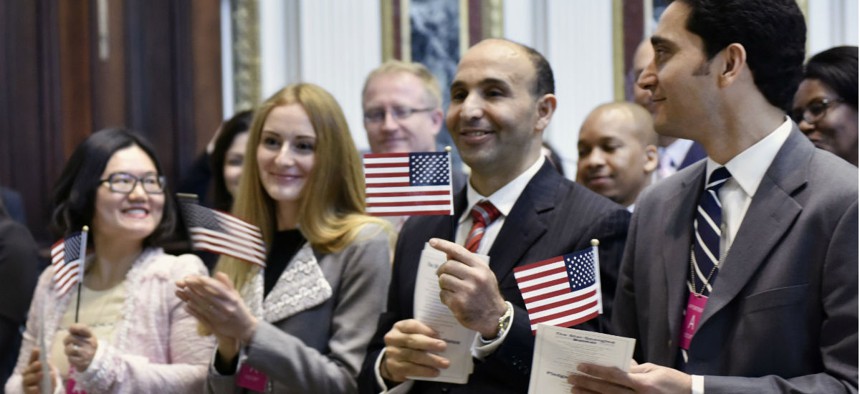
Immigrants take the Oath of Allegiance at a naturalization ceremony in Washington in October. DHS photo by Barry Bahler
How a Misleading Story Is Changing Immigration Policy
Erroneous claims that one of the San Bernardino shooters made public social-media posts about jihad have produced legislation to overhaul the process of screening visas.
On Sunday, The New York Times published a scorching story alleging that one of the killers in the San Bernardino attack had previously “talked openly on social media about her views on violent jihad.”
But by Thursday, the Times admitted it had gotten parts of the story wrong. Tashfeen Malik had not posted publicly about violent jihad before moving to the U.S. Instead, according to the FBI, she had written about violent jihad only in private messages—not public posts. The Times changed its story, issued a correction, and endured a particularly brutal public flogging at the hands of its public editor.
That correction, however, came far too late to put the genie back in the bottle. News of the so-called “public” posts had already rocketed around the Internet, been cited repeatedly in the Republican presidential debate, and, apparently, made quite an impression on Capitol Hill.
On Tuesday, Senator John McCain pointed to the Times report in announcing legislation to require the Department of Homeland Security to “search all public records, including Internet sites and social media profiles” when vetting applicants to enter the U.S.
The same day, nearly two dozen Democrats wrote to Homeland Security Secretary Jeh Johnson calling for “more robust social media background check process for all visitors and immigrants to the United States.” The letter references press accounts indicating that such work had been done inconsistently. And it says Malik “may have expressed radical jihadist sentiments on social media platforms.”
(That night, Ted Cruz took on the topic during the GOP presidential debate: “We didn’t monitor the Facebook posting of the female San Bernardino terrorist because the Obama DHS thought it would be inappropriate. She made a public call to jihad, and they didn’t target it.”)
Representative Vern Buchanan has introduced a House companion to McCain’s bill, and a pair of senators—Democrat Martin Heinrich and Republican Jeff Flake—have also rolled out a bill to ensure that DHS can review “open source” information, including social-media posts, of visa applicants.
To be clear, the Times story was one of several about Malik’s Internet activity and reviews of visa applications. And it came at a time of broad review of the nation’s screening process for people entering the country. So the Times story is not the only thing that spurred the legislative rush. But given that it was cited, either explicitly or implicitly, in a host of press releases surrounding the new bills, it appears clear the story was a key driver of the new legislation.
But on Wednesday, FBI Director James Comey knocked down claims of public postings by Malik, telling reporters that Malik and future husband Syed Rizwan Farook communicated online in late 2013 about their “joint commitment to jihad and to martyrdom.” But then, crucially, he added, “Those communications are direct private messages,” and he said there was “no evidence of posting on social media by either of them at that period of time and thereafter reflecting their commitment to jihad or to martyrdom.”
The key mistake in the Times story was reporting that Malik’s pro-jihad statements had been publicly available. Given the private nature of those messages, it’s unclear how the new slew of new bills this week, which deal largely with public postings, would have helped DHS better screen Malik or assess the threat she posed to national security.
But while the specific story was wrong, it has shined a light on what even administration officials say could be a real problem with the country’s counterterrorism efforts.
Johnson said Wednesday that his agency has been reviewing social media in immigration applications in certain instances since early this year, acknowledging that prior policies were “too restrictive,” Reuters reports.
Buchanan said in a statement that it “doesn’t change a thing” that the Times story, which helped set off the furor, was inaccurate. “We should be screening the social media of foreigners regardless of whether these two terrorists used public or private Facebook accounts. ISIS uses the Internet to recruit and radicalize terrorists. They have 40,000 Twitter accounts. We need to fight fire with fire,” he said.
A McCain aide expressed a similar view. “The fact remains that the Obama administration has clearly declined to review social media when conducting background checks of foreigners seeking to enter the United States—a policy that leaves us with a dangerous gap in intelligence that could make us vulnerable to another attack,” the aide said.
President Obama pushed back Friday on claims that officials do not review social-media postings. “Our law-enforcement and intelligence professionals are constantly monitoring public posts, and that is part of the visa-review process, that people are investigating what individuals have said publicly and questioned about any statements that [they] maybe made,” he said.
Still, policy changes appear in the works—with or without Capitol Hill.
Malik entered the U.S. on what’s known as a K-1 visa, which enables foreigners who are the fiancees of U.S. citizens to enter the country.
DHS posted a “fact sheet” Thursday about the K-1 visa program and its screening efforts more broadly, noting that in the wake of San Bernardino, a federal working group has formed to review the K-1 program. But DHS says that review could lead to broader reviews of social media across a wider suite of programs that enable foreigners to enter the U.S.
“The U.S. government already employs social media vetting in certain immigration benefits programs,” DHS said. “The working group is committed to expanding use of social media vetting and is examining appropriate opportunities, in conjunction with interagency screening partners, to do so across the range of visa programs, including the K-1 program.”







